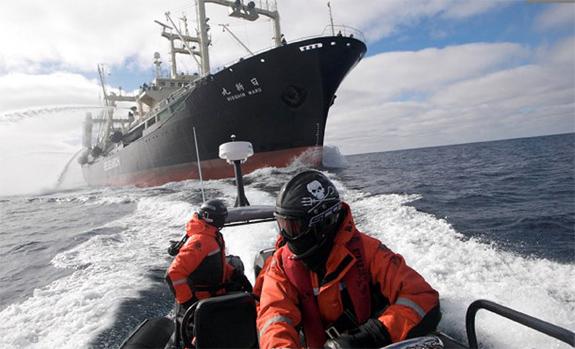I’ve been working my way through the first two seasons of Whale Wars, an Animal Planet documentary television series that chronicles the conflict between a group of anti-whaling activists and the crews of a Japanese whaling fleet in the Southern Ocean near Antarctica.
In it, the crew of the Sea Shepherd Conservation Society ship Steve Irwin works to disrupt the killing and processing of whales. They throw stink- and slippery-bombs onto the decks of whaling ships in an effort to disrupt the butchering process and contaminate whale meat. They take to relatively tiny rigid-inflatable boats, laying thick, floating line across the paths of oncoming whaling ships in the slim hope of fouling running gear. They even use their own 60-metre ship — 1,000 tons of fragile, cardboard-thin steel — to ram the larger, often faster whaling ships.
The tactics employed by both sides are incredibly dangerous. The fight often happens well below 70 degrees of southern latitude, at least 1,500 nautical miles from the nearest city. As tensions rise between the whalers and activists, skirmish by skirmish, the conflict becomes more unpredictable, and more violent.
Both sides lie, cheat and posture. They take great pains to manipulate the media and to curry favour in the forum of public opinion. They fight fire with fire.
This show is absolutely fascinating. It represents a sort of new mode of documentary journalism, an ow!-my-balls accounting of complex issues that places absolute primacy on audience engagement.
The series is a case study in how conflict escalates beyond meaningful dialogue when each side believes reason and justice won’t prevail, even from the moral and rational high ground. It’s a chronicle of a seemingly inevitable, violent collision of mutually exclusive values, a somehow benign analogy of how nations find themselves drawn into bloody, senseless warfare.
It’s also an illustration, frankly, of how worryingly malleable human perception can be, of how easily and quickly otherwise intelligent people can be convinced to say, do and believe right, things they previously believed to be morally wrong.
Perhaps most interestingly, and perhaps why I’m devoting a column to Whale Wars, is that it’s a study in activism. It shows, without contemporary Toronto-gay-community context, what happens when dialogue, letter writing, Facebookery and vigil standing are simply ignored by those whose chubby fingers monopolize the levers of power.
I find all of this so germane because, in the here and now of Toronto, a menacing array of circumstances are converging.
As the most obvious example, on May 25 I saw something I thought well beyond the realm of likelihood only a year ago: a group of intelligent, clear-eyed, well-respected gay and lesbian activists censored by, and separated from, members of their own Pride committee by an iron fence and police guard.
Regulations are easily twisted intellectual abstractions, created and interpreted by people. We, citizens and community members, simply cannot stand idle while rules, codes, laws or policies are employed as instruments of censorious oppression. Sometimes the only available next step — the best step — is civil disobedience. We gay folks know this most acutely because expressions of our very sexualities were illegal barely a generation ago (some still are).
Freedom of expression is the very foundation of gay and lesbian movements. As a peaceful demonstration of civil disobedience, QuAIA members and supporters should march in the parade, authors of their own messages, regardless of what Pride Toronto organizers, or their masters, have to say about it.
The board of directors and management of Pride Toronto already bear responsibility for the organization’s spineless waffling and censorious conduct. Are they also prepared to use physical force to keep gay and lesbian activists from marching in their own parade?

 Why you can trust Xtra
Why you can trust Xtra


